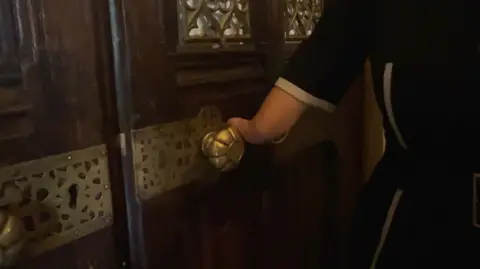Labour MP Marie Tidball says Parliament building 'inaccessible' as she campaigns for changes
Tidball, who was born with a congenital disability, highlights barriers such as heavy doors and round handles as MPs return from the summer recess
Marie Tidball, the Labour MP for Penistone and Stocksbridge, has described the Palace of Westminster as "inaccessible" and is campaigning for changes to help MPs, staff and visitors with disabilities navigate the building.
Tidball, a disability campaigner who was elected last July, told the BBC she was born with a congenital condition that affects all four limbs and leaves her with foreshortened arms and legs and one digit on each hand. She said getting into politics has been difficult and that getting around the Houses of Parliament presents further obstacles, pointing to heavy wooden doors and round, smooth door handles as examples. As MPs returned to Parliament after the summer recess, the BBC accompanied Tidball on a tour of the building.

Within months of taking her seat, Tidball said she had held multiple conversations with senior officials about the practical barriers she encounters. She recounted raising the issue of door handles repeatedly and said she sometimes jokes that she might have to chain herself to a handle to make change happen. Tidball told the BBC's James Vincent that the discussions have been ongoing but that physical features of the historic building continue to present everyday challenges.
Tidball missed three years of school as a child because of critical surgeries related to her condition. She has made accessibility a central part of her work since entering Parliament, pressing for adaptations that would make the estate easier to use for people with a range of mobility and dexterity needs.
The Palace of Westminster is a Grade I listed historic site, and its age and architectural features have long complicated efforts to retrofit modern accessibility measures. Tidball's account underscores the practical difficulties faced by people with disabilities in legislative workplaces, and it comes amid growing public focus on inclusivity in public institutions.
Advocates and lawmakers in other countries have also pushed for improvements to parliamentary access. Campaigners in the United States and elsewhere have called for better entrances, lifts, seating and workspace accommodations in national and state legislatures to ensure elected officials and staff with disabilities can participate fully.
Tidball said she has raised the issue repeatedly with parliamentary managers and other senior figures but did not set out a timetable for specific changes. Her campaign is aimed at prompting concrete adjustments to fixtures and building access so that the Houses of Parliament are usable by MPs, staff and visitors with disabilities without repeated special arrangements.
The BBC report said MPs were returning from the summer recess as Tidball continued her efforts to highlight barriers within the estate. Parliamentary authorities did not provide an immediate comment in the BBC coverage on any planned changes following Tidball's intervention. The issue adds to ongoing discussions about how to balance conservation of historic parliamentary buildings with the need to meet modern equality and accessibility standards.
Tidball's public account has drawn attention to the everyday practicalities of disabled parliamentarians' working lives and to the wider question of how legislative bodies adapt to ensure full participation by elected representatives with disabilities.